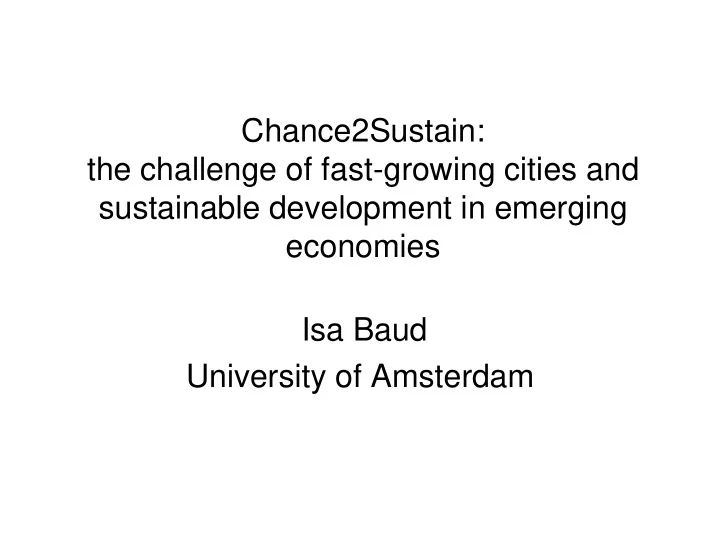

Chance2Sustain: the challenge of fast-growing cities and sustainable development in emerging economies Isa Baud University of Amsterdam
Framing city visions? Pro-growth coalitions visioning world class cities - slum-free cities - Mega-projects - safe communities for middle-class and elite Pro-poor voices and coalitions in cities - Producing knowledge on lived experience - Claiming spaces for greater security Dealing with uncertainty and complexity
Main question: how can city development strategies promote integrated development? • 3 areas of concern • 2 instruments • Economic growth through • Spatial knowledge mega-projects management to • Social engagement for strategically integrate dialogue, participation of processes (ec,soc.env) citizens • Decentralized financial • Promoting green flows to support city economy, environmental development strategies management
Research Approach: learning from experience across borders • Comparing fast-growing cities in different political and economic contexts – four countries (BRICS) – India, South Africa, Peru and Brazil • ten cities across four countries (Delhi, Kalyan Dombivili, south Chennai (IT corridor), Durban and Capetown, Lima and Arequipa, and Guarulhos in Sao Paolo region, Salvador de Bahia, Rio de Janeiro) • Methodology: learning from contrasting city case studies, including inter-active knowledge building with planners, communities, governments, practitioners
Partners European Association of Development Research EADI and Training Institutes Amsterdam Institute for Metropolitan and AMIDST International Development Studies CNRS French National Center for Scientific Research School of Planning and Architecture SPA Cities for Life Forum FORO Centro Brasileiro de Análise e Planejamento CEBRAP Norwegian Institute for Urban and Regional NIBR Research University of KwaZulu-Natal UKZN
Theme 1: Economic growth • Importance of mega-projects in overall strategies for economic development? • How do agglomeration economies improve city capacity for more resilient development? • How does the political economy of these projects link to existing governance patterns? • How do megaprojects affect urban spatial dynamics: urban landscapes, social integration and urban economy?
T heme 1 cont’d: Mega-projects and urban planning • How are land issues for megaprojects managed? • What (spatialized) information is included in mapping for planning: production, access and dialogues by involved actors? • How are social and environmental impacts taken into account in planning projects?
Contructing urban landscapes: Tiete Linear Park – Sao Paulo
2 emblematic case studies in India • Delhi : Shashtri Park Depot: mixed use project near city centre; new urban actors and PPP projects; neoliberal principles of cost recovery • Chennai : IT Corridor : large-scale project on urban periphery; state-promoted economic specialisation in conjunction with private-led residential and commercial development
Theme 2: Sub-standard settlements • Understanding diversity of sub-standard settlements • Accessing service provision • Engaging with governance networks • Mobilising local knowledge and insights • Standardisation and/or experimental innovation?
Spaces for voices: engaging the other • Pro-growth spaces • Pro-poor spaces • Developers and • Social organisations; financers working with fragmented different tiers of communities governments • Social mobilisation – • Local governments different pathways risks marginalization? and power • Exceptional versus • Community-based regular processes? knowledge as resource
Theme 3 Water related Risks and Water Governance • Community water vulnerability mapping • Actor water- vulnerability, knowledge and competency mapping • Integration of knowledge through inclusive scenario building
Inclusive Scenario Building on Water and Climate Change • Cases at city level (Lima, Arequipa in Peru) • Cases at city – extension level (Guarulhos (Sao Paulo, Brazil), Dvarka (Mumbai, India) and Northern Durban.
Spatial Knowledge management: instrument increasing capacity for urban development • Economic growth strategies have to deal with uncertainty and complexity • Need for adaptive capacity in dealing with dynamic processes • Spatial knowledge strategic instrument in analysing socio-economic and environmental patterns and trends • Generating knowledge through ‘forums’ – closing knowledge gaps • ICT support in governance processes (MIS, interface with citizens, feedback from citizens)
Fiscal flows and instruments: decentralisation, participatory budgetting • Autonomy of local government versus other tiers? • Conditional programmes, designated goals • Own revenues and other sources • Budgeting and engagement with civil society • Accountability: to whom?
Interactive engagement as methodology • learning from contrasting city case studies • inter-active knowledge building with planners, communities, governments, practitioners • New platforms supporting ‘spaces’ for engagement • ICT, web 2.0, Google maps, mobile phone systems, radio, community maps, social media, decision table • How are such instruments used and valued in your work?
Water provision in sub-standard settlement Delhi
Drawing in tacit knowledge – participatory workshops • Councillors and administrators combined • Setting issues priorities • Setting spatial priorities • Outcome: – Common understanding – Fewer contestations
Prioritizing issues by ward in Kalyan -Dombivili
Your views on increasing adaptive capacity in Durban for city development through : • Economic growth through mega-projects • Environmental management and green growth • Promoting social engagement • Producing and using spatial knowledge management • what and whose priorities reflected in spending budgets and flows
Recommend
More recommend